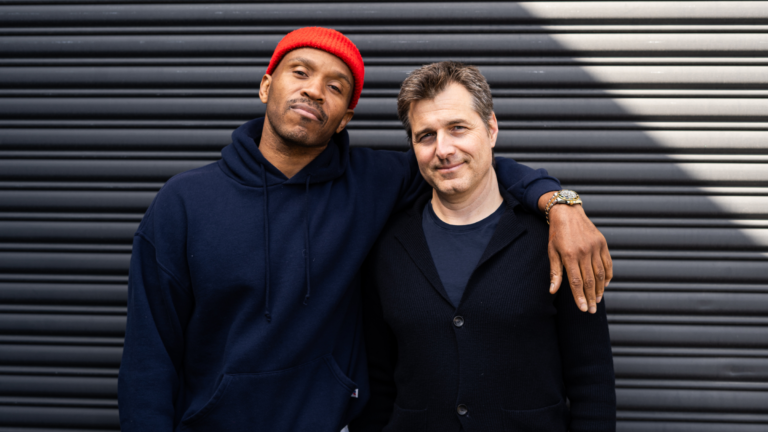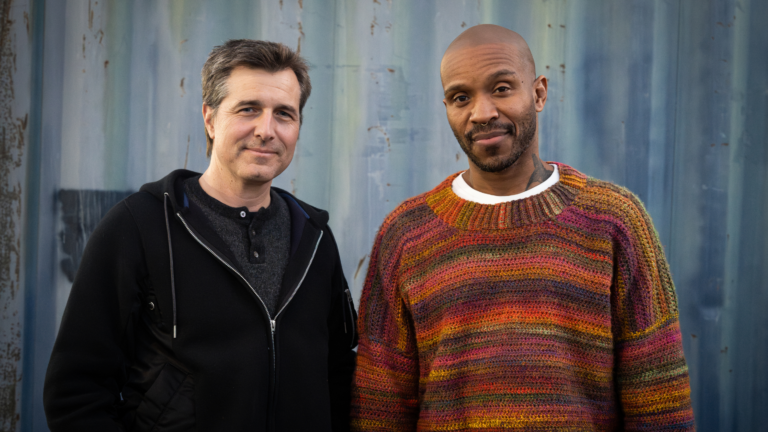This week’s conversation is with Gabriel Wyner, a polyglot, former opera singer, bestselling author of Fluent Forever: How to Learn Any Language Fast and Never Forget It, and founder of the Fluent Forever app, the most funded app in crowdfunding history.
Gabe graduated summa cum laude in 2007 from the University of Southern California with dual degrees in Mechanical Engineering and Vocal Arts Performance, and was awarded the Renaissance Scholar’s prize for excellence in unrelated disciplines.
Following graduation, Gabe moved to Europe to pursue a triple Master’s degrees in Opera, Lieder, and Voice where he found himself quickly needing to learn various new languages as his studies took him from country to country.
Gabe began to apply his analytical and engineering talents to developing a system that rapidly builds fluency and in 2012 published a viral article about his groundbreaking formula to fluency, which garnered a publishing offer within two hours.
Now, Gabe is fluent in eight languages and teaches tens of thousands of people around the world using his unique language-learning method through The Fluent Forever App.
I was curious to learn how Gabe has mastered a skill that many people find incredibly difficult, but this conversation isn’t just about how to learn a new language – it’s about Gabe’s unique frameworks for learning, how to make memories stick, and why, in his opinion, we’ve been taught the wrong way.
“We are immersed in information… and our brains are rebelling against that. We don’t need this much information, and levels of processing is how it makes the choices as to what gets to stay and what gets thrown out.”
In This Episode:
His childhood experience with learning new languages
My language learning stuff started in elementary school. I went through like seven, eight years of Hebrew. I now know 10 words of Hebrew. That’s a lot of years for not a lot of words. And that was upsetting. And so I tried again in high school and junior high with Russian, spent five and a half years working on Russian. I got really good grades. I had really good teachers. I won a silver medal in this Olympiad thing where you walk in and you try to memorize a bunch of phrases and impress some judges. I left that thing knowing 50 words of Russian plus a memorized epic poem for kids. I didn’t speak Russian… That was where I left it. I was just like, “I don’t know how this works. How is it that I can do well ostensibly in a course, but not learn a language at the end of it? Why did I show up here in the first place? Was this just to get a grade?”
The three levels of language
There are these lists from the Foreign Service Institute that they’re training all of our spies and diplomats and things like that, where they’ve really come down to the science of this language is this hard for this English speaker and this language is in another category. They have levels one, two and three, and level one is the Romance set. Level two are things that tend to have a new alphabet. They tend to have enough new grammar and vocabulary that isn’t just Romance-derived that it’s like, “Okay, there’s some new challenges here.” So those will be things like Hebrew and Russian and Greek. Hungarian actually fits in that category. Even though Hungarian has this reputation for being super, super hard, it’s in the same category as Russian and Greek and the rest. And level two languages take twice as long for an English speaker to learn, just twice as many hours. And I’ve seen this, I’ve experienced this. They really do feel twice as hard, but they’re not twice as hard because the language itself is intrinsically hard. They’re hard because there’s just less shared data between that language in English. And then level three is one step further removed. These are things like Japanese and Mandarin and Arabic, actually, which is oddly twice as hard as Hebrew, and level three languages are twice as hard as level two and four times as hard as level one.
Does his method translate to learning other things (other than language)?
Language learning is a great example of the thing you’re trying to do, which is to say what happens when you want to get data into someone’s head? Period. That’s the actual only question you have to answer with language. People think of language as this kind of magical, brutally hard thing, and when you really dig down, what it ends up being is it is just the challenge of there’s a lot of data outside my head, I need to get it in my head. And so when you’re dealing with that, then the biggest rock of all is, well, what is a memory? Period. How do we form memories? What are those things? What is the mechanism we use to build memories?
Levels of processing in learning
This is a framework from the 1970s where basically they came up with this list of words that are simple, bear or apple, pear, stuff like that. And they stuck a bunch of college students in a room and basically quizzed them on these words at random by putting a question in front of each one. They were like, “How many p’s in the word bear? How many letters are in the word apple?” Things like that. So they would ask some set of questions that are all about the spelling of the word. Then they’d ask another set of questions about the sound of the word. So they’d ask like, “Does bear rhyme with pear? Does student rhyme with pear?” Things like that. They had a third level of questions that asked about the concept itself. “Is a student furry? Is a bear furry? Is a pizza furry?” And then they would ask things that had personal or emotional content to it. So they would ask, “Is a bear scary? Is a student scary?” They do this a lot with adjectives. “Are you red? Are you sad? Are you big?” Some kind of personal connection to this thing. Then, they’d distract the students for a little while, then they’d give them a surprise memory test. “Here’s a blank sheet of paper. Write down all the words we asked you about. Did we ask you about bears? Students? Just tell me everything we asked you a question about.” And what they found is that if you ask about the spelling of a word, you basically don’t remember. They remembered like 15% of those words. Spelling is not an interesting thing.
The link between memory and imagery
Our ability for imagery, for memorizing imagery, is really only rivaled with our ability for spatial memory. Memory palaces are a way to completely get past really all limits in terms of the human ability to only hold about five to seven things in your head. There’s a great example that you can do with people very, very quickly, where you basically say, okay, let’s get you a grocery list of 30 items where you have no chance of remembering those lists because your working memory is five to seven items long, period. You don’t get to have extensions on your working memory. And then you tell someone, “Okay, picture your childhood house, picture your current house. Where do you live right now?” And you’re like, “On the front door, your first item on your grocery list is oranges, and so I want you to take an orange, I want you to crush it over the door handle and just juice the orange on your door handle. Now, open the door, and then in the doorway, I want you to take the milk and I want you to smash it on the floor and just stomp all over it and make a mess” and you just keep walking through and destroying things in your house. You do this like 15 times in a row, and then you ask them to recite the grocery list from front to back or back to front, and they can do it easily, instantly. No gaps in it at all.
Adding emotion and personal experience
Is it imagery or is it personal, is really the question. Can you jump to the concepts, the bear has four legs, or can you jump to I’m afraid of bears? Those are the two that I think are the most interesting. The cheat code to getting to the bear has four legs is using imagery. I think that’s where we got off onto memory palaces because you can overlap imagery and stuff there, but the personal connection front is there are techniques for that, but there’s no cheat codes. You actually have to delve into your own memories. What do I think of bears? What are my experiences with bears, et cetera? And so there’s prompts, there’s ways that you can condition yourself to regularly go back and be like, “Now, what do I feel about this topic,” that will make you think about the personal connections and delve into that level four, but there’s no quick immediate fixes like imagery, where imagery will immediately bump you into that third level.
The love of getting better
The idea of walking into a voice lesson where your first week you can sing eight notes, and then someone says, “Hey, why don’t you try to sing in your nose like a witch,” and you’re like, “That’s weird, but okay,” and they’re like, “Just practice singing a scale like you’re a witch for a week.” You’re like, “This is a weird, magical thinking thing you’re trying to get me to do, but sure, I’ll do it. I’m paying you to tell me what to do, guess I should do the things you’re telling me to do.” And you show up the next week and now you can sing 12 notes instead of the 8. Then you think, “Well, that’s weird.” And then they tell you to do a different thing, and then the next week, you can sing 14 notes, and then the next week you can sing 18 notes and some of them are kind of low, and then you can start learning how to sing louder. I think there’s steady progress that I think sometimes people get addicted to in the gym, where they’re able to lift more weight each time, but they don’t necessarily… I think that can give some people a feeling of progress, but also it’s such incremental progress over such a long time that it doesn’t necessarily feel super rewarding. But if one day you can lift one weight and then the next day you grew three more arms and you could lift three different weights at the same time, that would feel super accomplished. You’d be like, “Wow, I just grew another pair of arms.” That was my experience in singing.
His mission
I think there’s a piece of just how it’d be beautiful to land in the world, and I think there’s a separate thing of just my own personal passion. So how it would be beautiful to land in the world is I’ve spent all this time failing to learn languages, and then I spent a bunch of time succeeding at this thing. Other people should get the same opportunity. When I built this method, it was too hard to use for most people. It involved learning a bunch of computer skills and pulling on all these free apps online and assembling them in a certain way that’s kind of annoying. And so a lot of people got excited about the prospect of, “Wait, I’m actually capable of learning a language,” but then dropped it the moment they started seeing, “Ah, but it takes all these steps. I think I don’t have time for this.” And so the idea of being able to come out in the world and say, “Okay, well, yeah, that was a lot of work, but what about this? What if you just plugged into this thing, you just did the things we told you to, and then you spoke French next year. How about that?” I want that to exist. That does exist now, but I want that to exist at broad scale. I want people to know about it. I want it to be this idea of just, oh yeah, yeah. You want French? Cool, just go to do this thing and it’ll fix it for you.
Is there a “prime time” to learn a new language?
We all walk around with this myth in our culture that, “I can’t learn as fast because I’m an adult.” It’s that if only my parents had given me whatever, Spanish, when I was four years old, it all would’ve been better. But then I grew up and I hit this age, and the age was seven or the age was 12 or just we pick a random number, and the age was some number where I lost my ability to learn a language. And now I have this block and I’m going to have this block for the rest of my life. And there’s some people that don’t have the block, but I have the block and I’m screwed. That’s what we believe as a group.
Your brain wants to forget
The level of processing thing is not actually about what helps you remember things, it’s actually about what is your brain actively doing to make you forget? Because if you walk through a grocery store and you memorized every single brand of deodorant there, you would go nuts. And if you listened to a podcast and you memorized every single word that was said during this hour-long thing, you would also go nuts. We encounter so much information in our lives. We are immersed in information, even more so now because of all this cell phone stuff and everything like that, and our brains are rebelling against that. We don’t need this much information, and levels of processing is how it makes the choices as to what gets to stay and what gets thrown out actively with violence. And so when you’re sitting there with an app being like, “Perro is the word for dog,” your brain is like, “Fuck you. I don’t care about that. That means nothing to me,” whereas if you take a different experience of you go to your local Mexican restaurant and someone’s like, “Hey, you should try the Jamaica,” and you drink this purple liquid or this beautiful-looking drink and it tastes like flowers and it’s good, and at the end of it you’re like, “That was refreshing, Jesus. Okay,” you have no problem remembering Jamaica three years later.
Two key takeaways
Takeaway one is if you can’t hear it, you can’t remember it. You spending literally one or two weeks in the beginning focusing on ear training and just starting to learn how to hear all these crazy new sounds in the language you want, that is going to unlock you in ways that nothing else can. And that’s where you have to start. That’s not a middle thing. It’s not an end thing. It’s a start thing. That would be takeaway one. That’s the one barrier that language is different from from anything else, is just there is a thing where if you can’t hear it, you’re screwed. So fix that first… that. The second thing, second big takeaway is going to be this levels of processing idea. It’s live in a space where you are learning from images, not translations. And ideally, you’re learning from images that resonate from your life. That you’re not learning perro is the word for dog, but you’re learning perro is picture of your own dog that you care about, and that the word dog never enters into the equation at all. It’s literally just perro equals, “Oh, that’s Norbert.”


